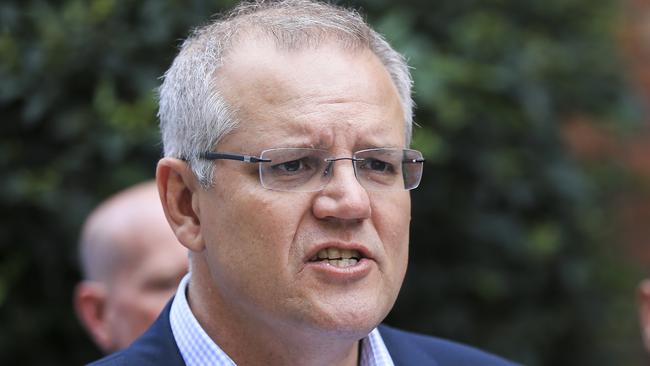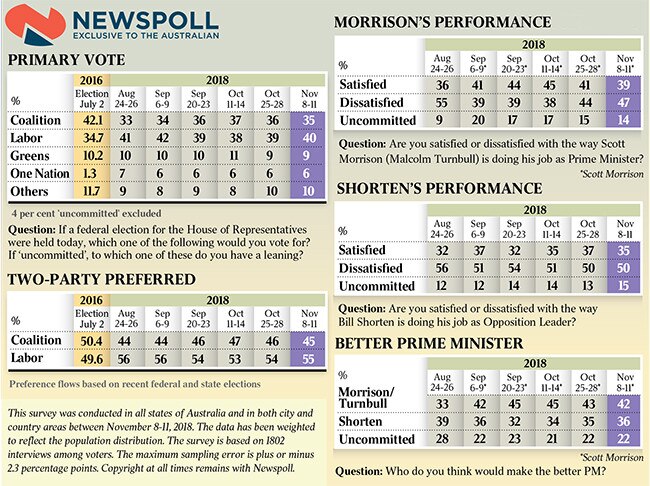Coalition and PM continue to slide down slippery poll
The PM’s approval rating has taken another hit in the wake of Malcolm Turnbull’s tirade against those who plotted his downfall.

Scott Morrison has failed to arrest the slide in support for the government, with his own approval rating taking another hit in the wake of Malcolm Turnbull’s tirade against those who plotted his downfall.
An exclusive Newspoll conducted for The Australian shows the Coalition falling back another point to trail Labor 55-45 on a two-party-preferred basis.
It is the second poll in a row showing a fall in support for the government since its defeat in the Wentworth by-election and erases almost all the gains made during September and October as it began to show signs of recovery from the damage of the leadership spill.
The Prime Minister’s initial popular appeal also continued to fade, with his approval ratings dipping further into negative territory while the margin to Labor leader Bill Shorten for preferred prime minister also narrowed.
The most recent poll comes after Mr Turnbull’s hour-long interview last week on the ABC in which he dumped on senior cabinet ministers involved in the leadership spill against him, and called on his colleagues to explain his political execution. The reprisal, which forced Mr Morrison to respond by claiming Mr Turnbull was dumped because he didn’t connect with mainstream Australia, followed the Prime Minister’s week-long bus tour of regional Queensland where he sought to engage in marginal electorates that will play a significant role in next year’s election.
In a sign that the Morrison government was also failing to connect with voters, Labor posted a further one-point gain in popular support to reach a commanding primary vote of 40 per cent.
The Coalition’s primary vote fell by a point to 35 per cent.
This is two points higher than the 10-year record low of 33 per cent recorded on the weekend following the August 24 spill and two points down on the 37 per cent it had reached in mid-October when there were signs the government might be mounting an electoral recovery.
The last time prior to the leadership spill that the Coalition’s primary vote was this low was in October 2017 when the government was in the grip of the citizenship crisis and facing divisions within its ranks over the gay marriage plebiscite. For Labor, it is only the third time it has posted a primary vote above 40 per cent since February 2015.
The numbers for all other parties remained unchanged, with the Greens on 9 per cent, One Nation firm on 6 per cent and the vote for “other” minor parties and independents at 10 per cent. The gloss continued to come off Mr Morrison’s leadership, after he had initially become the first prime minister to post a positive net satisfaction rating in more than two years.
However, the latest poll showed satisfaction with his performance dropped further, this time two points to 39 per cent.
This adds to a significant fall of four points in the last poll following Wentworth.
At the same time, those dissatisfied with Mr Morrison rose sharply by three points to 47 per cent, leading to an overall net negative satisfaction rating of minus eight points.
Mr Shorten, however, fared only marginally better having dropped two points in approval to 35 per cent but remaining on a 50 per cent dissatisfied rating, bringing his net negative satisfaction numbers to minus 15 — an improvement on the minus 24 he recorded in early August.
Mr Morrison fell another point in the head-to-head leadership contest with Mr Shorten, with 42 per cent rating him as the preferred prime minister ahead of the Labor leader, who improved a point to 36 per cent.
The poll of 1802 voters nationally was conducted between last Thursday and Sunday.

Liberal MP Tim Wilson said neither Mr Turnbull’s Q&A appearance or Mr Morrison’s Queensland tour were to blame for the government’s worsening performance in Newspoll.
“In the end it comes to whether the government is focused on the bread and butter issues … and that’s what we’re doing,” he told Sky News.
“I don’t blame anything. The reality is we have politicians always doing things and we have former prime ministers at the moment doing things. What actually matters is the tone of the discussion across the time frame. It’s not about individual incidents.”
Opposition defence spokesman Richard Marles said Labor would not focus on polls and that the actual election campaign would determine who would take government next year.
“Most people don’t focus on politics until a couple of weeks out from an election … It’s a bit like the finals in the footy,” he told Sky News.




